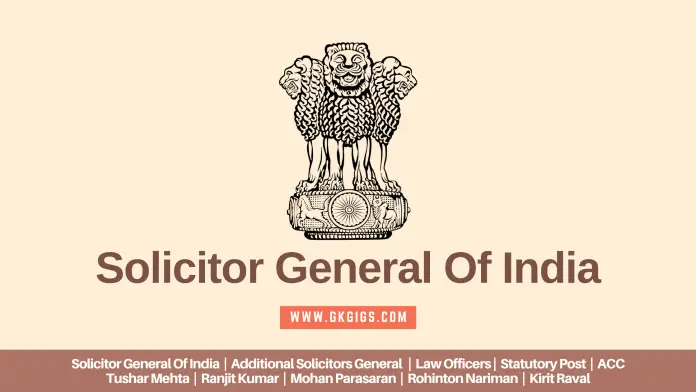
Last Updated: 31 January 2023
The Solicitor General of India (SGI) is subordinate to the Attorney General for India. They are the Second-Highest Law Officers in India. The Solicitor General of India assists the Attorney General and is assisted by the Additional Solicitors General of India (Addl. SGIs).
The SGI and the Addl. SGIs advise the Government and appear on behalf of the Union of India in terms of the Law Officers (Conditions of Service) Rules, 1972.
The posts of the Solicitor General and the Additional Solicitors General are merely statutory (Enacted or Created) unlike the post of Attorney General for India, which is a Constitutional post under Article 76 of the Constitution of India.
Page Contents
Solicitor General Of India At A Glance
| # | Header | Details |
|---|---|---|
| 1 | Abbreviation | SGI |
| 2 | Reports to | Attorney General for India |
| 3 | Appointer | ACC |
| 4 | Term length | 3 Years (As Per the Discretion of ACC) |
| 5 | Formation | 28 January 1950 |
| 6 | First holder | C. K. Daphtary |
| 7 | Deputy | Addl. Solicitors General |
| 8 | Attorney General for India | R. Venkataramani (1 Jul 2017) |
| 9 | Solicitor General of India | Tushar Mehta (11 Oct 2018) |
Who Is The Solicitor General Of India?
The Solicitor General of India is Tushar Mehta
Who Appoints The Solicitor General Of India?
The Appointments Committee of the Cabinet (ACC) recommends the appointment and officially appoints the Solicitor General of India.
The proposal for appointment of Solicitor General and Additional Solicitor General of India is generally moved at the level of Joint Secretary (or Law Secretary) in the Department of Legal Affairs and after obtaining the approval of the Minister of Law & Justice, the proposal goes to the ACC and then to the President of India.
What Is the Term Of The Solicitor General Of India?
3 Years (As Per Discretion of ACC)
What Are The Duties Of The Solicitor General?
The Solicitor General of India works under the Attorney General of India. Duties of a Solicitor General are laid out in Law Officers (Conditions of Service) Rules, 1987:
- They give advice to the Government of India upon Legal Matters and Perform other Duties of a Legal Character, as may from time to time, be referred to or assigned to them by the Government of India.
- The Solicitor General appears, whenever required, in the Supreme Court or in any High Court on behalf of the Government of India in cases (including Suits, Writ Petitions, Appeals, and other Proceedings) in which the Government of India is concerned as a party or is otherwise interested.
- SG represents the Government of India in any reference made by the President of India to the Supreme Court under Article 143 of the Constitution.
- They discharge other functions as are conferred on a Law Officer by or under the Constitution or any other Law for the time being in force.
What Are The Limitations Of The Solicitor General
- The Solicitor General of India is not allowed to advise any Party against the Government of India or a Public Sector Undertaking, or in cases in which he is likely to be called upon to Advise, or Appear for, the Government of India or a Public Sector Undertaking.
- SG is not allowed to hold briefs in any court for any Party, except the Government of India or the Government of a State or any University, Government School or College, Local Authority, Public Service Commission, Port Trust, Port Commissioners, Government aided or Government managed hospitals, a Government company, any Corporation owned or controlled by the State, any Body or Institution in which the Government has a preponderating interest.
- He is not allowed to defend an accused person in a Criminal Prosecution without the permission of the Government of India.
- He is not allowed to accept an appointment to any office in any Company or Corporation without the permission of the Government of India.
- The Solicitor General is not allowed to advise any Ministry or Department of the Government of India or any Statutory Organization or any Public Sector Undertaking unless the Proposal or a Reference in this regard is received through the Ministry of Law and Justice, Department of Legal Affairs.
List Of Solicitor General Of India
| # | Solicitor General | Term Start | Term End | Term Length | Prime Ministers |
|---|---|---|---|---|---|
| 1 | Chander Kishan Daphtary | 28 Jan 1950 | 01 Mar 1963 | 13 Years 32 Days | Jawaharlal Nehru |
| 2 | H. N. Sanyal | 02 Mar 1963 | 09 Sep 1964 | 1 Year 191 Days | Jawaharlal Nehru + Lal Bahadur Shastri |
| 3 | S. V. Gupta | 10 Sep 1964 | 16 Sep 1967 | 3 Years 6 Days | Lal Bahadur Shastri + Indira Gandhi |
| 4 | Niren De | 30 Sep 1967 | 30 Oct 1968 | 1 Year 30 Days | Indira Gandhi |
| 5 | Jagadish Swarup | 05 Jun 1969 | 04 Jun 1972 | 2 Years 365 Days | Indira Gandhi |
| 6 | Lal Narayan Sinha | 17 Jul 1972 | 05 Apr 1977 | 4 Years 262 Days | Indira Gandhi |
| 7 | S. N. Kacker | 05 Apr 1977 | 02 Aug 1979 | 2 Years 119 Days | Morarji Desai |
| 8 | Soli Jehangir Sorabjee | 09 Aug 1979 | 25 Jany 1980 | 169 Days | Charan Singh |
| 9 | Keshava Parasaran | 06 Mar 1980 | 08 Aug 1983 | 3 Years 155 Days | Indira Gandhi |
| 10 | Milon Kumar Banerji | 04 Apr 1986 | 03 Apr 1989 | 2 Years 364 Days | Rajiv Gandhi |
| 11 | Ashok Desai | 18 Dec 1989 | 02 Dec 1990 | 349 Days | V. P. Singh |
| 12 | A. D. Giri | 04 Dec 1990 | 01 Dec 1991 | 362 Days | Chandra Shekhar |
| 13 | Dipankar P. Gupta | 09 Apr 1992 | 10 Apr 1997 | 5 Years 1 Day | P. V. Narasimha Rao + H. D. Deve Gowda |
| 14 | Tehmtan R. Andhyarujina | 11 Apr 1997 | 04 Apr 1998 | 358 Days | Inder Kumar Gujral |
| 15 | Nitte Santhosh Hegde | 10 Apr 1998 | 07 Jan 1999 | 272 Days | Atal Bihari Vajpayee |
| 16 | Harish Salve | 01 Nov 1999 | 03 Nov 2002 | 3 Years 2 Days | Atal Bihari Vajpayee |
| 17 | Kirit Raval | 04 Nov 2002 | 19 Apr 2004 | 1 Year 167 Days | Atal Bihari Vajpayee |
| 18 | Goolam Essaji Vahanvati | 20 Jun 2004 | 07 Jun 2009 | 4 Years 352 Days | Manmohan Singh |
| 19 | Gopal Subramaniam | 15 Jun 2009 | 14 Jul 2011 | 2 Years 29 Days | Manmohan Singh |
| 20 | Rohinton Fali Nariman | 23 Jul 2011 | 04 Feb 2013 | 1 Year 196 Days | Manmohan Singh |
| 21 | Mohan Parasaran | 15 Feb 2013 | 26 May 2014 | 1 Year 100 Days | Manmohan Singh |
| 22 | Ranjit Kumar | 07 Jun 2014 | 20 Oct 2017 | 3 Years 135 Days | Narendra Modi |
| 23 | Tushar Mehta | 11 Oct 2018 | ~ | ~ | Narendra Modi |
Related: Attorney General Of India (2023 List Updated)
List Of Additional Solicitors General
| # | Additional Solicitors General | Appointment | Term Length |
|---|---|---|---|
| 1 | Vikramjit Banerjee (Supreme Court) | 05 Mar 2018 | 4 Years 264 Days |
| 2 | Madhavi Goradia Diwan (Supreme Court) | 18 Dec 2018 | 3 Years 341 Days |
| 3 | K.M. Nataraj (Supreme Court) | 14 Jan 2019 | 3 Years 314 Days |
| 4 | Sanjay Jain (Supreme Court) | 17 Jan 2019 | 3 Years 311 Days |
| 5 | Balbir Singh (Supreme Court) | 30 Jun 2020 | 2 Years 147 Days |
| 6 | Suryaprakash V. Raju (Supreme Court) | 30 Jun 2020 | 2 Years 147 Days |
| 7 | N. Venkataraman (Supreme Court) | 30 Jun 2020 | 2 Years 147 Days |
| 8 | Jayant K. Sud (Supreme Court) | 30 Jun 2020 | 2 Years 147 Days |
| 9 | Aishwarya Bhati (Supreme Court) | 30 Jun 2020 | 2 Years 147 Days |
| 10 | Rajdeepak Rastogi (Rajasthan HC) | 28 Jul 2014 | 8 Years 119 Days |
| 11 | Satya Pal Jain (Punjab & Haryana HC) | 08 Apr 2015 | 7 Years 230 Days |
| 12 | Anil Chandrabali Singh (Bombay HC) | 09 Jul 2017 | 5 Years 138 Days |
| 13 | Shashi Prakash Singh (Allahabad HC) | 09 Feb 2018 | 4 Years 288 Days |
| 14 | Nargund N. B. (Karnataka HC) | 18 Dec 2019 | 2 Years 341 Days |
| 15 | T. Surya Karan Reddy (Southern Zone) | 18 Dec 2019 | 2 Years 341 Days |
| 16 | R. Sankaranaryanan (Madras HC) | 30 Jun 2020 | 2 Years 147 Days |
| 17 | Asok Kumar Chakrabarti (Calcutta HC) | 09 Jul 2022 | 138 Days |
| 18 | Devang Girish Vyas (Gujarat HC) | 30 Jun 2020 | 2 Years 147 Days |
| 19 | Chetan Sharma (Delhi HC) | 01 Jul 2020 | 2 Years 146 Days |
| 20 | Krishna Nandan Singh (Patna HC) | 01 Jul 2020 | 2 Years 146 Days |
Fee And Allowances Of Law Officers
| No. | Nomenclature of the Item of Work | Rates of Fees Payable for Appearance & Work |
|---|---|---|
| 1 | Suits, Writ Petitions, Appeals, and References Under Article 143 | ₹16,000/- per case per day |
| 2 | Special Leave Petitions and other Applications | ₹5,000/- per case per day |
| 3 | Settling Pleadings (including Affidavits) | ₹5,000/- per pleading |
| 4 | Settling Statement of Case | ₹6,000/- per case |
| 5 | For Giving Opinions in Statements of Cases sent by the Ministry of Law | ₹10,000/- per case |
| 6 | For written submission before the Supreme Court, High Court, and Commissions of Inquiry or Tribunals and the like | ₹10,000/- per case |
| 7 | Appearance in Courts outside Delhi | ₹40,000/- per day per case |
In addition to the above fee payable for cases, a retainer fee is paid to the Solicitor General and the Addl. Solicitors General at the rate of Rs. 40,000, and Rs. 30,000 per month, respectively.
Questions On Solicitor General Of India
Answer: Tushar Mehta
Answer: 20 Additional Solicitor Generals
Answer: Appointments Committee of the Cabinet (ACC)
Answer: The proposal for appointment of Solicitor General, Additional Solicitor General is generally moved at the level of Joint secretary (or Law Secretary) in the Department of Legal Affairs and after obtaining the approval of the Minister of Law & Justice, the proposal goes to the Appointments Committee of the Cabinet (ACC) and then to the President of India.
Answer: Tushar Mehta
Answer: No
Answer:
1) They give advice to the Government of India upon Legal Matters and Perform other Duties of a Legal Character, as may from time to time, be referred to or assigned to them by the Government of India.
2) The Solicitor General appears, whenever required, in the Supreme Court or in any High Court on behalf of the Government of India in cases (including Suits, Writ Petitions, Appeals, and other Proceedings) in which the Government of India is concerned as a party or is otherwise interested.
3) SG represents the Government of India in any reference made by the President of India to the Supreme Court under Article 143 of the Constitution.
4) They discharge other functions as are conferred on a Law Officer by or under the Constitution or any other Law for the time being in force.
Answer: 3 Years
Answer: Chander Kishan Daphtary (28 Jan 1950 – 1 Mar 1963)
Answer:
1) Attorney General is the highest law officer in India while the Solicitor General is the highest law officer in the State.
2) The post of Attorney General of India is a Constitutional post under Article 76 of the Constitution of India while the posts of the Solicitor General and the Additional Solicitors General are merely statutory (Enacted or Created).
3) There is no fixed term for the Attorney General of India while the term of the Solicitor General of India is for 3 Years.
Answer: ₹40,000 (Only Retainer Fee)
Answer: ₹30,000 (Only Retainer Fee)
Judiciary Of India
| No. | Header | Details |
|---|---|---|
| 1 | Administration | Ministry of Law and Justice A) Department of Legal Affairs B) Legislative Department C) Department of Justice D) Law Commission of India |
| 2 | Civil Courts | Supreme Court of India A) Chief Justice of India B) Judges of the Supreme Court High courts of India A) Chief justices of High Courts B) Judges of High Courts District courts of India |
| 3 | Criminal Courts | Supreme Court of India A) Chief Justice of India B) Judges of the Supreme Court High Courts of India A) Chief Justices of High Courts B) Judges of High Courts Sessions Courts A) Courts of Judicial Magistrate of First Class B) Courts of Judicial Magistrate of Second Class |
| 4 | Courts of Executive Magistrates | A) Courts of Divisional Commissioners B) Courts of District Magistrates C) Courts of Sub-Divisional Magistrates |
| 5 | Legal Profession | A) Bar Council of India B) Attorney General of India C) Solicitor General of India D) Additional Solicitors General E) Advocates General |
| 6 | Legal Education | A) Autonomous Law Schools in India B) List of Law Schools in India |
| 7 | Others | 1) Alternative Dispute Resolution A) Lok Adalat B) Village Courts 2) Constitution of India A) Basic Structure B) Directive Principles C) Fundamental Duties D) Fundamental Rights 3) Indian Penal Code A) Civil Procedure Code B) Criminal Procedure Code 4) Judicial activism in India National Judicial 5) Appointments Commission Supreme Court Collegium |
| Read Interesting Articles |
- List Of Chief Justice Of India (2023 Updated)
- Order Of Precedence In India With PDF (2023 Updated)
- 100+ GK On Mahatma Gandhi: Life, Family, Career, Movements
- List Of Female Governors In India (2023 Updated)












